#Musicals Operetta Broadway
Text
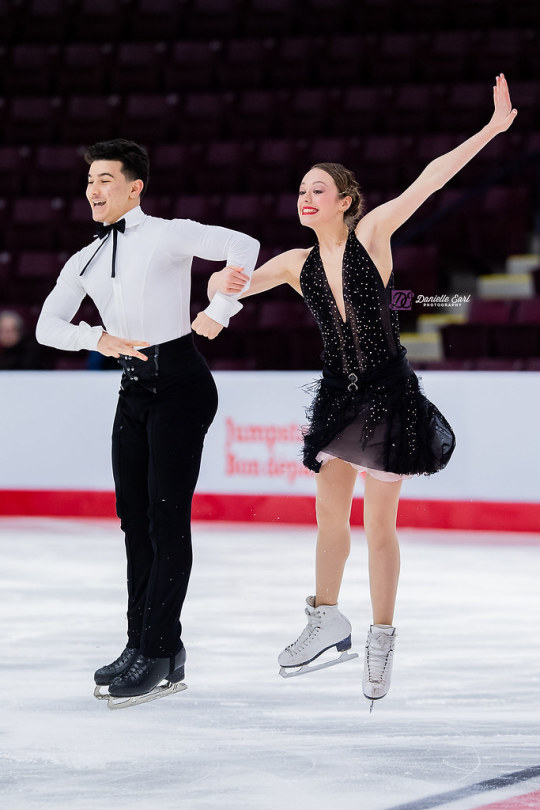
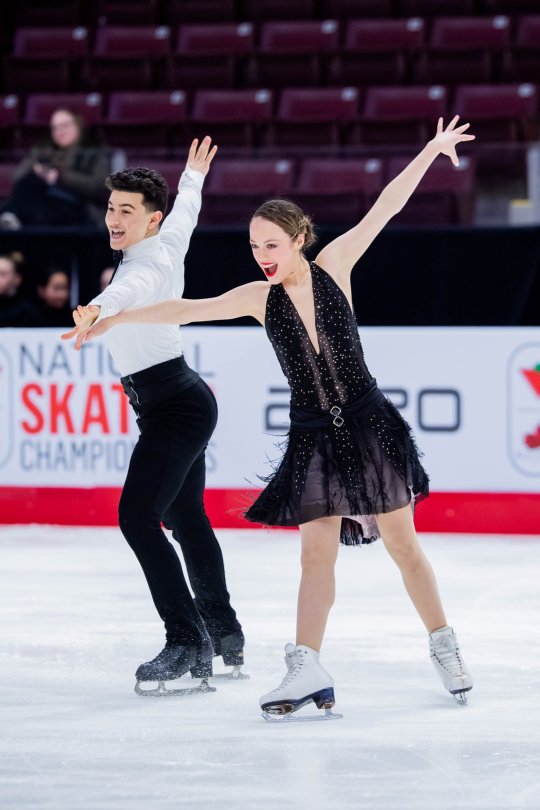
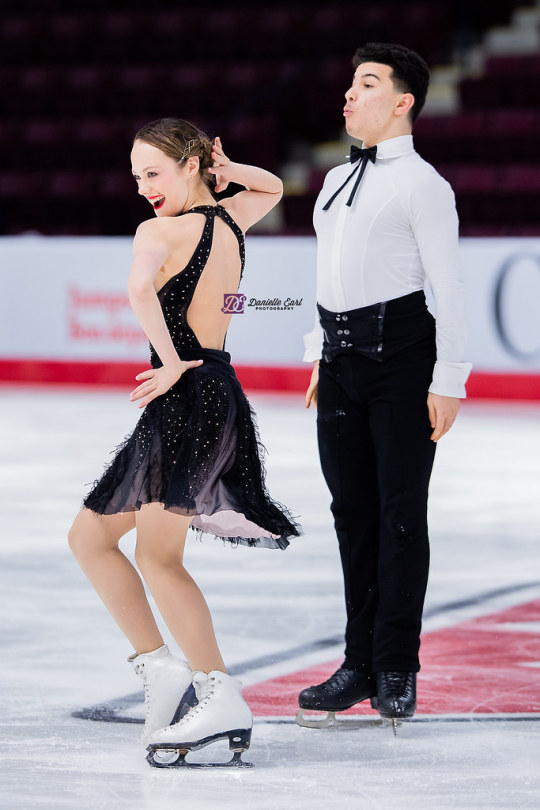
Emmy Bronsard and Aissa Bouaraguia competing in the 2020 Junior Canadian Championships.
(Sources: Danielle Earl Photography and Skate Canada)
#Emmy Bronsard#Aissa Bouaraguia#Bronsard Bouaraguia#Musicals Operetta Broadway#Tea Time Foxtrot#Figure skating#Ice dance#Canada#2020 Junior Canadian Nationals#2019–2020
12 notes
·
View notes
Text

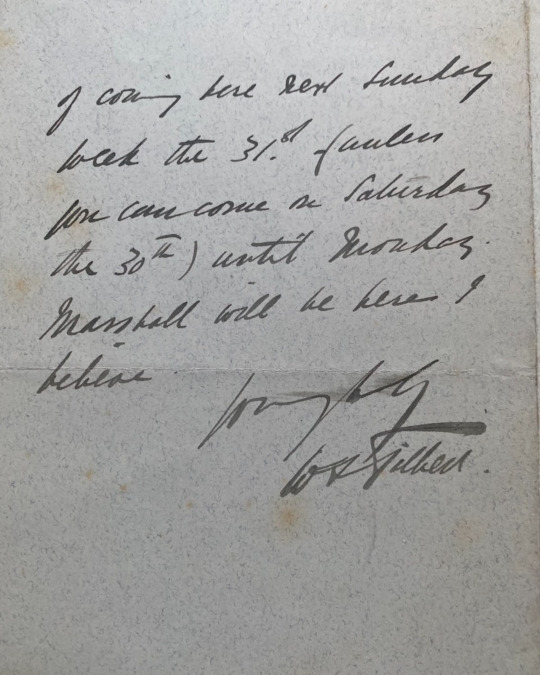

OTD in Music History: “The Pirates of Penzance,” a “topsy-turvy” comic opera with lyrics by dramatist W.S. Gilbert (1836 – 1911) and music by composer Arthur Sullivan (1842 – 1900), receives its New York premiere in 1879.
Gilbert and Sullivan are still widely recognized as one of the all-time-great teams in musical history, churning out more than a dozen classic comic operas (including “H.M.S. Pinafore” and “The Mikado”) between 1871 – 1896, many of which continue to delight audiences nearly a century and a half later.
In 1922, conductor Sir Henry Wood (1869 – 1944) explained the enduring success of their remarkable collaboration as follows:
“Sullivan has never had an equal for brightness and drollery, for humour without coarseness and without vulgarity, and for charm and grace. His orchestration is delightful: he wrote with full understanding of every orchestral voice. Above all, his music is perfectly appropriate to the words of which it is the setting.... He found the right, the only cadences to fit Gilbert's happy and original rhythms, and to match Gilbert's fun or to throw Gilbert's frequent irony, pointed although not savage, into relief. Sullivan's music is much more than the accompaniment of Gilbert's libretti, just as Gilbert's libretti are far more than words to Sullivan's music. We have two masters who are playing a concerto. Neither is subordinate to the other; each gives what is original, but the two, while neither predominates, are in perfect correspondence. This rare harmony of words and music is what makes these operas entirely unique. They are the work not of a musician and his librettist nor of a poet and one who sets his words to music, but of two geniuses..."
PICTURED: Two short autograph letters, handwritten and signed (separately) by Gilbert and Sullivan, respectively.
#The Pirates of Penzance#W.S. Gilbert#Arthur Sullivan#Gilbert and Sullivan#Gilbert#Sullivan#comic opera#opera#aria#bel canto#Broadway#baritone#bass#tenor#mezzo-soprano#contralto#soprano#classical music#music history#operetta#composer#classical composer
7 notes
·
View notes
Text
New opera, musical & theatre discord server
I created a new discord server for anything related to theatre. Hoping to create an active and nice community. Come and join if you want to talk about theatre, share art & memes, watch streams together and much more! https://discord.com/invite/2kj4AP5b4E
#opera#operetta#theatre#theater#musical theatre#musicals#broadway#west end#european musicals#plays#stage play#shakespeare#mozart#wagner#puccini#verdi#tchaikovsky
0 notes
Text
a series of discussions regarding casting in theatre.
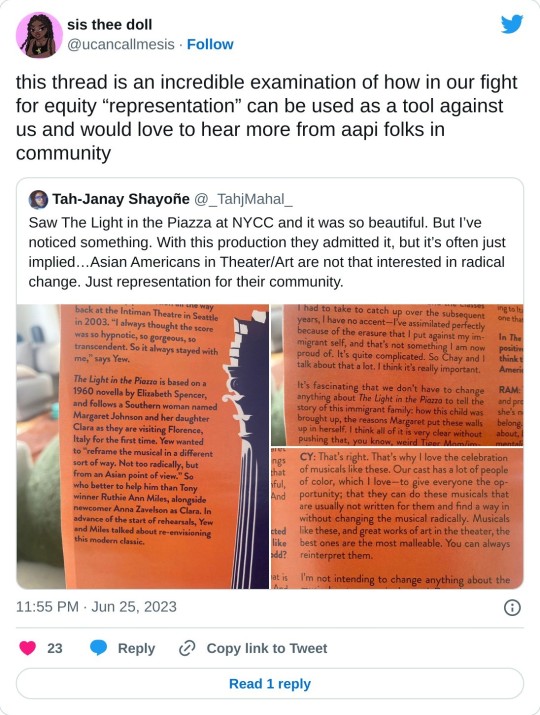
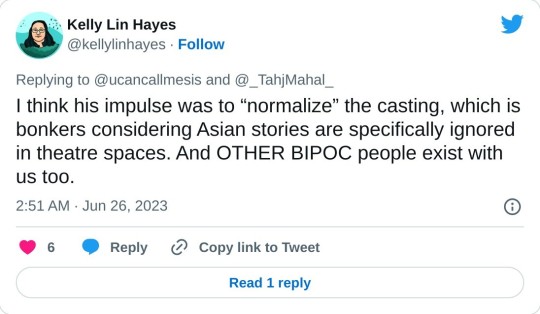
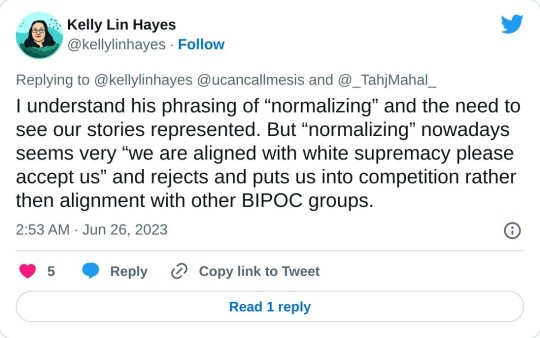
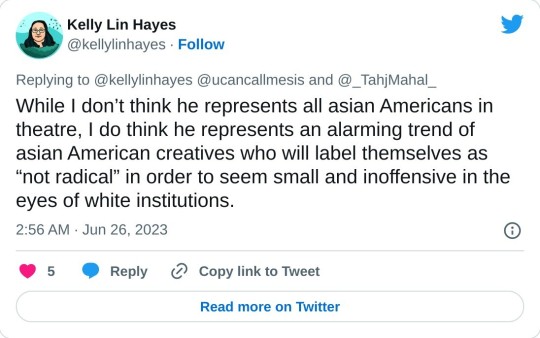
original thread:
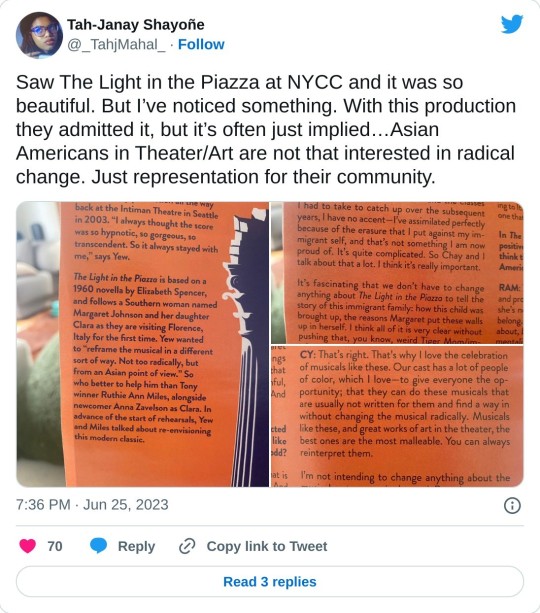
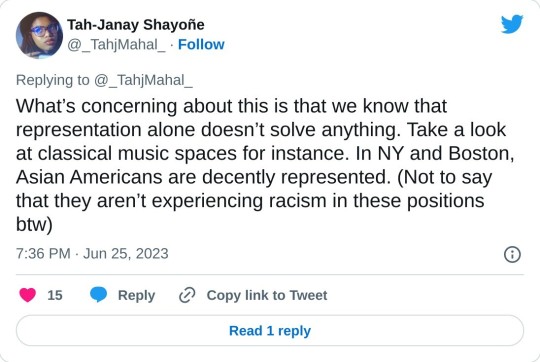
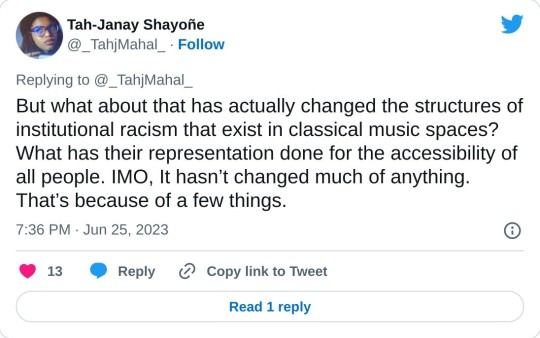
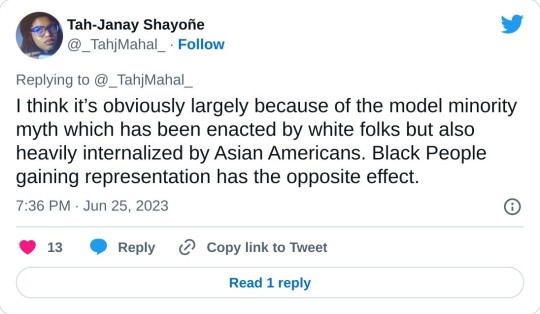
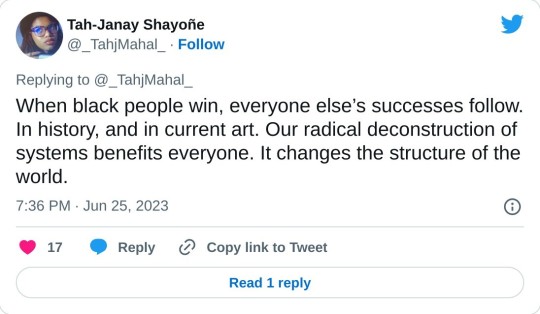
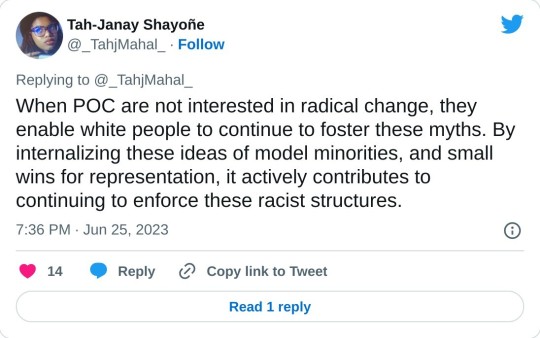
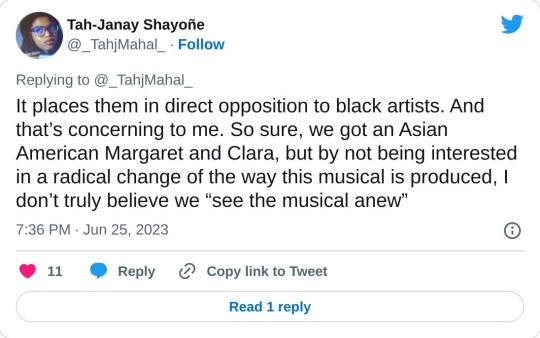
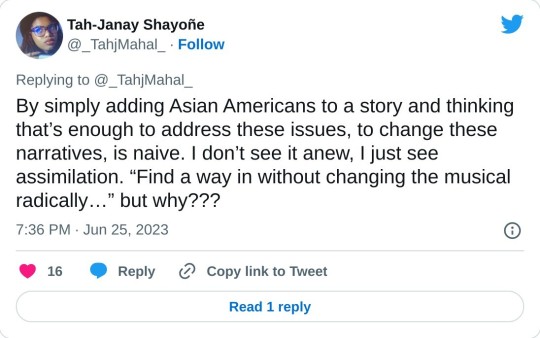
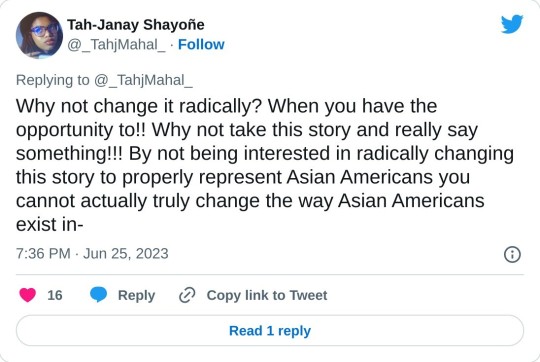
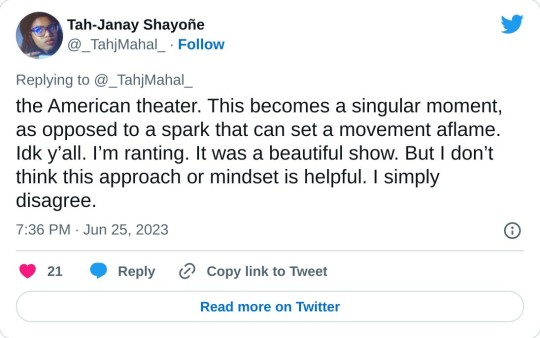
further commentary from an East Asian American perspective:
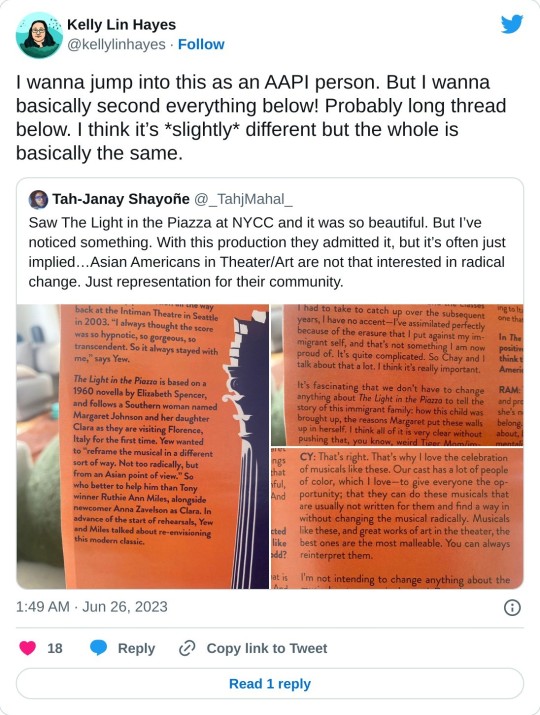

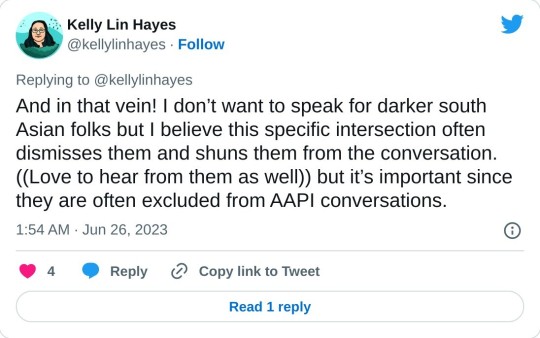

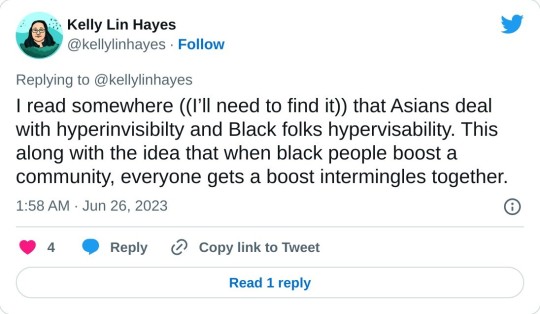
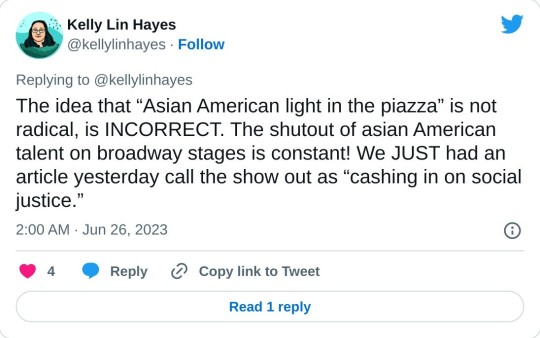
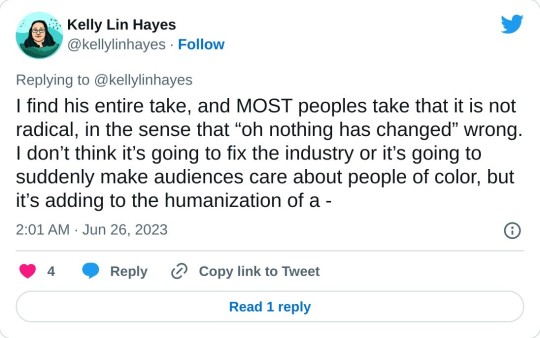
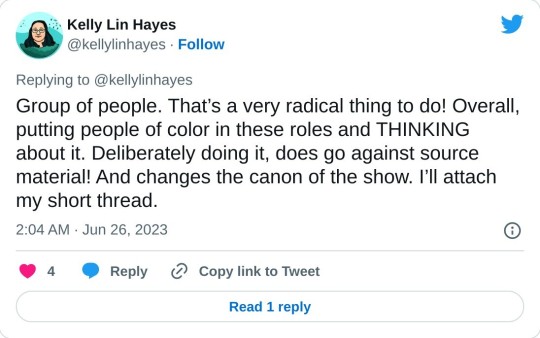

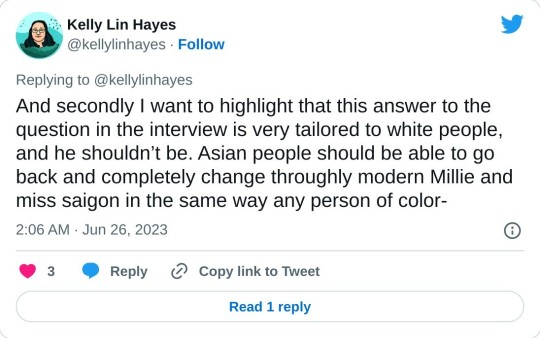
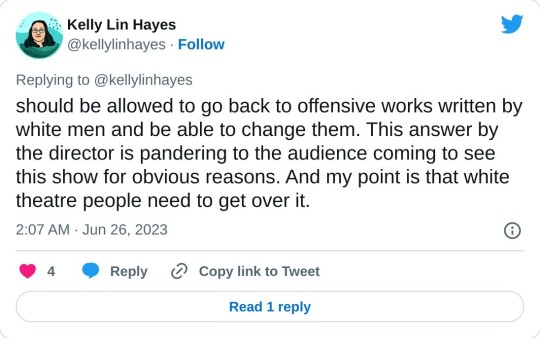
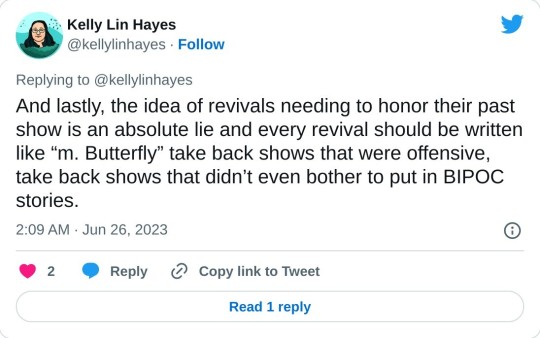
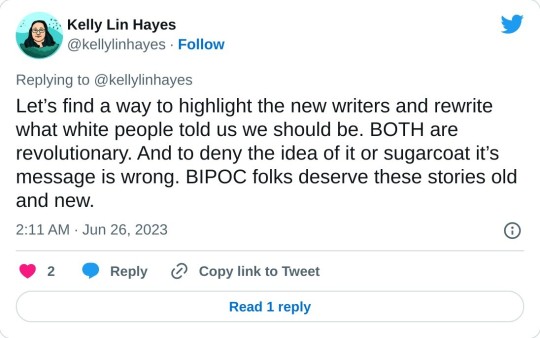
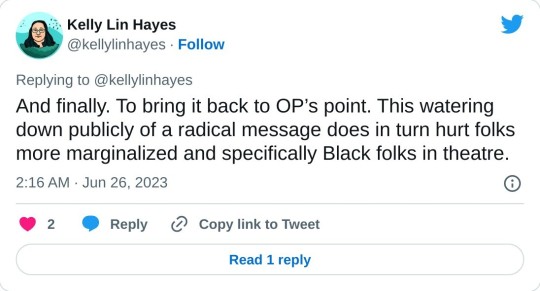
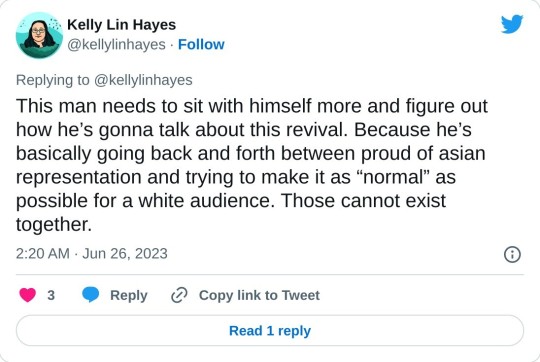

(The rest of the thread can be found here).
(The thread that was quote tweeted within this other thread).
would love to hear your thoughts on the matter! from my own south asian american perspective, I agree. I especially agree about the fact that radical advances made by Black theatre performers benefit other people of color, so other people of color need to side with members of the wider community as a whole, not with that of trying to appease white people. Sucking up to oppressive systems never works, and even if the grift lasts a while, it ultimately harms the community (in politics- with Nikki Haley and Vivek Ramaswamy, racism will affect them one way or another). Broadway has had so few South Asian shows (it took until 2021 for Aladdin to have a South Asian Aladdin and Jasmine! This is not good!) and hopefully that changes in coming years. Radical change is needed and it has to be called radical.
#musical theatre#the light in the piazza#I am forever thankful for the work done by Black theatre artists that helped get Broadway to a less homogeneous place#American musical theatre was quite literally cultivated in racism from the beginning (operettas/light operas + minstrel shows/vaudeville)#that's how the modern american musical came about
1 note
·
View note
Text
The Crux of Christie MacDonald
Musical comedy star Christie MacDonald (1875-1962) may be most interesting to modern readers with respect to her private life. Her first husband was stage and screen actor William Jefferson (son of the famous Joseph Jefferson of Rip Van Winkle fame) and she reportedly once had a liaison with Big Tim Sullivan that resulted in issue (the baby was put up for adoption).
The Broadway shows MacDonald…
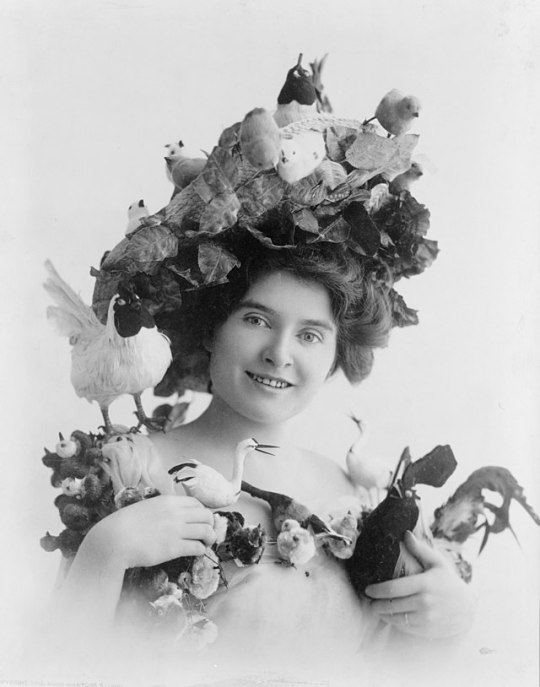
View On WordPress
1 note
·
View note
Text
Olga (Ollie) Burgoyne
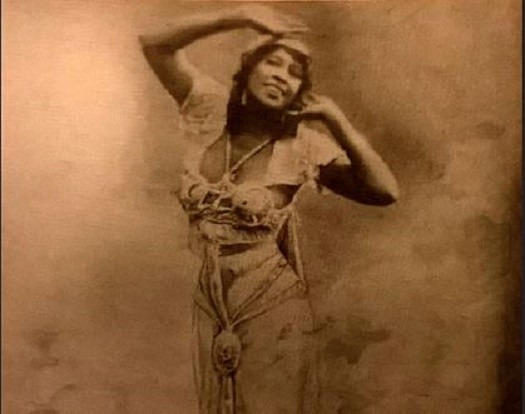
Olga “Ollie” Burgoyne, also known as Ollie Burgoyne-Calloway, was a singer and dancer specializing in Russian and other ethnic dances. She was also an actress and businesswoman who gained popularity during the Harlem Renaissance and left her mark as one of the most influential African American dancers and choreographers of that time.
Ollie Burgoyne was born in Chicago, Illinois, on June 13, 1879. She was part Russian and part Creole. Ollie’s cousin, Ida Forsain, toured Russia and specialized in Cossack dancing. Influenced by Forsain, Burgoyne debuted at age 17 in John Isham’s Oriental America nightclub in Chicago in 1896. In 1901, at age 22, she embarked on an eight-year tour of Europe (Germany, France, Denmark, Switzerland, Hungary, and Russia) with seven singing and dancing girls known as the Louisiana Amazon Guards.
In 1903, Burgoyne briefly returned to the United States and joined the cast of the operetta In Dahomey, which was the first African American musical to be performed on Broadway. After her performance, Burgoyne formed Duo Eclatant with partner Asher Watts. She also founded the Burgoyne Musical Company.
During her years in Russia (1904-1914), Burgoyne performed in many prestigious venues, including the Krestovskiy Garden Amusement Park (St. Petersburg) and the Aumont Theater (Moscow). She also made side trips to Odessa in what is now Ukraine, Athens, Greece, Istanbul, Turkey, and Cairo, Egypt. She opened the Maison Creole lingerie store in downtown St. Petersburg (Russia), where she employed a staff of 27. In August 1914, while Burgoyne was vacationing in Marienbad, Austria, World War I broke out, and she was unable to return to Russia and thus lost her businesses and properties there.
Between 1914 and 1929, Burgoyne continued to tour mainly in western Europe. Her specialties were Brazilian, Spanish, and Russian dances, which she mastered while traveling. She briefly returned to the United States during this period, where she performed in New York City, Chicago nightclubs, and Harlem’s Lafayette Theater. In 1925, Burgoyne produced two dance revues, Darktown Strutters, and Harlem Strutters, in New York. She also appeared in ten Broadway productions between 1926 and 1937.
In 1931, Ollie Burgoyne was named one of the eight major dancers and choreographers of the Harlem Renaissance, part of an elite group that also included Hemsley Winfield, Edna Guy, Randolph Sawyer, Asadata Dafora, Katherine Dunham, Charles Williams, and Pearl Primus. In April 1936, when Burgoyne was 57 years old, she appeared in the play Mississippi Rainbow, performed at the Lafayette Theater. In the later years of her life, Burgoyne taught dance and worked periodically in the film industry, starring in movies such as Laughing (1930) and The Timid Ghost (1937). With a career spanning nearly 50 years, Ollie Burgoyne died on April 2, 1974, in Oxnard, California, at the age of 95.
140 notes
·
View notes
Video
youtube
"Cleopatterer," from Leave it to Jane, 1917, sung by Joan Morris.
Today, P.G. Wodehouse is known for his novels and stories, especially those about that valet of valets, Jeeves. But for 30 years beginning in 1904, Wodehouse also wrote the books and lyrics for 33 musicals. In 1917 alone, he had five shows running on Broadway at once.
But Wodehouse produced more than hits: he was one of the great innovators in American musical theater. He steered it away from revues and imported operettas to stories about contemporary life that had a plot that made some sense. As a lyricist (or “lyrist,” to use the older term that he preferred), Wodehouse used vernacular speech rather than flowery poetics.
#vintage New York#1920s#1910s#P.G. Wodehouse#Jerome Kern#Joan Morris#theater#musical theater#Broadway musical#William Bolcom#lyricist#Leave it to Jane#Cleopatterer
134 notes
·
View notes
Text
THE LEGEND OF ANASTASIA
“Perhaps the myth of a surviving Nikolaevna is a lie we tell ourselves because it’s easier than accepting the slaughter of their innocent children for the sins of the parents.”
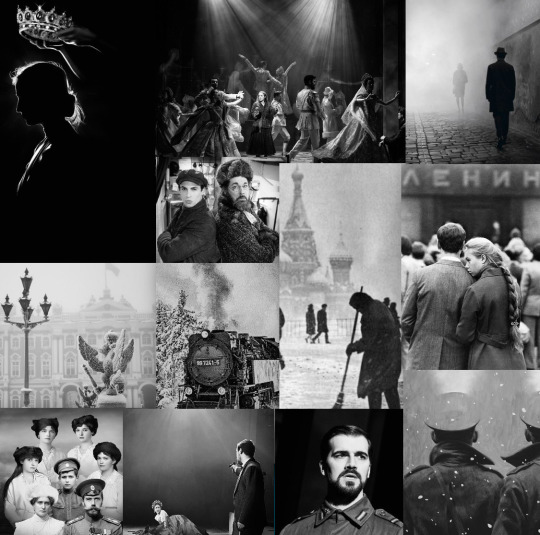
The Legend of Anastasia is a Pygmalion tale that discusses Russian history & the nuances, ups, and downs of Imperial and Soviet politics in the early 20th century. This is a rewrite and movie adaptation script of Anastasia the musical and the original 1952 French play Anastasia by Marcelle Maurette. I also took inspiration from different aspects of the Anastasia plays, films, ballets, the operetta, and stage musicals (Hartford, Broadway, the North American tours, replica and non-replica productions around the world, & one regional production).
I fell in love with the Anastasia musical (even though it’s extremely flawed) and started writing a script in 2021 of how I’d adapt it into a darker movie musical. If you enjoy Anastasia the musical, dark-mature historical fiction, and Russian history then please check out my adaption script on АО3. I hope you’ll enjoy it!
#anastasia#musical#anastasia the musical#anastasia musical#musical theater kid#broadway musicals#gleb vaganov#anya#glenya#anya anastasia#anya romanov#dimya#dimitri anastasia#Dimitri#ao3 writer#ao3 fanfic#ao3fic#ao3 author#AO3#ao3 link#ao3feed#Youtube#writeblr#archive of our own#writers on tumblr#writers on ao3#fandoms#writing community#writing#writer
24 notes
·
View notes
Text
As much I’d like a Broadway RetJ production, though…I just know they will adapt it in these key ways:
It’s a comedy!!! Teens being teens fighting and lusting after each other!!! Jokes and gags everywhere even when inappropriate!!! It’s all a good time with our 2000s pop score!!! What do you mean Presgurvic’s score is more operetta than pop, we really just want another & Juliet hit!!! Shut up and give us your money dance!!!!
It’s about the Feud(tm), not the icky romance!!! It’s a cautionary tale of prejudice, machismo, and extremism!!! R&J don’t really matter but as 2-dimensional ciphers in this tale of internecine conflict!!! Verona is tough, gritty, and dystopian, and believe you me, it’s going to look it!!! Come see West Side Story 2.0, featuring our author pets protagonists Mercutio, Benvolio, and Tybalt and this cute side couple!!! Wait, why do you keep mentioning this popular Hungarian version of the musical? Honestly, we’ve never seen it (nor will we ever). Even if we have, ours will be worse different, okay? Just trust us!!!
I’m sorry, but this concert operetta shit just won’t fly on ✨Broadway✨, home to such masterpieces as Mean Girls the Musical, so we’re going to cut songs and replace them with idiotic dialogue pronto. Shakespearean, of course, because that works so naturally and seamlessly with the modern pop-rock score/19th century Viennese operetta vibes. We need to correct the grievous sin error of Presgurvic for not having even Shakespeare paraphrase, after all. Not because we’re fans of the play, pfft, hell no, we just have this overly literal idea of a musical being like a play so not to have Shakespeare is just wrong, you hear?
We’re not even going to do an actual production, lol, we’ll just do a concert in English à la Kristina från Duvemåla, see if it holds water, idek. Even if it is popular we’ll come up with an excuse not to do it anyway. You know us.
#🤮#romeo et juliette#retj#oh heavy burden#roméo et juliette#rómeó és júlia#or hell both#don’t think i don’t know how these people are#cristina is silly#she causes herself pain for no good reason#english retj#is a dream so quickly turned to nightmare#alas
15 notes
·
View notes
Text
Holidays 12.30
Holidays
Cleaning Day (Haiti)
Falling Needles Family Fest Day
Feast of the Holy Family
Festival of Enormous Changes at the Last Minute
Flail Day French Republic)
Freedom Day (Scientology)
Incwala Day (Eswatini, f.k.a. Swaziland)
International Day of Indian Cinema
Kodachrome Day
Let's Make A Deal Day
Lhosar (Gurung People, Nepal)
National Cheryl Day
National Resolution Planning Day
New Year’s Eve Eve
Rizal Day (Philippines)
Smart Highway Day
Take a Walk Show
Tamu Lochar (Sikkim, India)
Food & Drink Celebrations
Bacon Day [also 8.31]
Baking Soda Day
Coffee Day (Hawaii)
Drink With a Straw Day
International Day of the Donut
Kona Coffee Day
National Bicarbonate of Soda Day
5th & Last Saturday in December
Evergreen Tree Day [Last Saturday]
Last Saturday of the Year [Last Saturday]
Independence Days
Day of the Declaration of Slovakia as an Independent Ecclesiastic Province
Midget Nation-in-Exile (Declared; 2009) [unrecognized]
Northern Federation of Occidental Republics (Declared; 2012) [unrecognized]
USSR (Established, 1922)
Xenlandia (Declared; 2021) [unrecognized]
Feast Days
Abraham the Writer (Christian; Saint)
Anysia of Salonika (Christian; Saint)
Boxing the Jesuit Day (Church of the SubGenius)
The Clam (Muppetism)
Ecgwine of Worcester (Christian; Saint)
Egwin of Evesham (Christian; Saint)
Felix I, Pope (Christian; Saint)
Frances Joseph-Gaudet (Episcopal Church)
Gall (Positivist; Saint)
Get Drunk Early for Hogmanay Day (Pastafarian)
Kwanzaa, Day 5: Nia (Purpose)
Liberius of Ravenna (Christian; Saint)
Louis-Jean-François Lagrenée (Artology)
Maximus (Christian; Saint)
Obatala’s Day (Pagan)
Ralph of Vaucelles (Christian; Saint)
Roger (a.k.a. Ruggero) of Cannae (Christian; Saint)
Sabinus, Bishop of Assisi, and his companions (Christian; Martyrs)
Sixth Day of Christmas (a.k.a. Bringing in the Boar)
Twelve Holy Days #5 (Leo, the heart; Esoteric Christianity)
Twelvetide, Day #6 (a.k.a. the Twelve Days of Christmas or Christmastide) [until 1.5]
Lucky & Unlucky Days
Butsumetsu (仏滅 Japan) [Unlucky all day.]
Premieres
Alice, Darling (Film; 2022)
Aqua Teen Hunger Force (TV Cartoon Series; 2000)
Ben-Hur: A Tale of the Christ (Film; 1925)
Born to Die, by Lana Del Rey (Song; 2011)
The Curious Puppy (WB MM Cartoon; 1939)
Dallas (Film; 1950)
The Gallopin’ Gaucho (Disney Cartoon; 1928)
Kiss Me, Kate (Broadway Musical; 1948)
Let’s Make a Deal (TV game Show; 1963)
A Man Called Otto (Film; 2022)
The Merry Widow, by Franz Lehár (Operetta; 1905)
My Way, recorded by Frank Sinatra (Song; 1968)
Nelly’s Folly (WB MM Cartoon; 1961)
No Man of Her Own (Film; 1932)
Rob Roy, by Walter Scott (Novel; 1817)
The Roy Rogers Show (TV Series; 1951)
Some Came Running, by James Jones (Novel; 1957)
Sounder, by William H. Armstrong (Novel; 1969)
Tainted Dreams (TV Soap Opera; 2013)
Tangled Up In Blue, recorded by Bob Dylan (Song; 1974)
Tin Yop (Pixar Cartoon; 1988)
Two’s a Crowd (WB MM Cartoon; 1950)
Why Him? (Film; 2016)
Today’s Name Days
Felix, Lothar (Austria)
Feliks, Rajner, Srećko (Croatia)
David (Czech Republic)
David (Denmark)
Taave, Taavet, Taavi, Taavo, Tavo (Estonia)
Daavid, Taavetti, Taavi (Finland)
Roger (France)
Herma, Hermine, Minna (Germany)
Anisios, Filetairos, Gideon, Josef (Greece)
Dávid (Hungary)
Eugenio (Italy)
Dāvids, Dāvis (Latvia)
Dovydas, Gedrimė, Gražvilas, Irmina, Sabinas (Lithuania)
David, Diana, Dina (Norway)
Dawid, Dawida, Dionizy, Eugeniusz, Irmina, Katarzyna, Łazarz, Rainer, Sabin, Sewer, Uniedrog (Poland)
Anisia (Romania)
Dávid (Slovakia)
Judit, Judith, Raúl (Spain)
Abel, Set (Sweden)
Ainsley, Kelsa, Kelsey, Kelsi, Kelsie, Mason (USA)
Today is Also…
Day of Year: Day 364 of 2024; 1 days remaining in the year
ISO: Day 6 of week 52 of 2023
Celtic Tree Calendar: Beth (Birch) [Day 5 of 28]
Chinese: Month 12 (Jia-Zi), Day 18 (Ren-Xu)
Chinese Year of the: Rabbit 4721 (until February 10, 2024)
Hebrew: 18 Teveth 5784
Islamic: 17 Jumada II 1445
J Cal: 4 Fest; Foursday [4 of 5]
Julian: 17 December 2023
Moon: 87%: Warning Gibbous
Positivist: 28 Bichat (13th Month) [Gall]
Runic Half Month: Eihwaz or Eoh (Yew Tree) [Day 5 of 15]
Season: Winter (Day 10 of 89)
Zodiac: Capricorn (Day 9 of 31)
3 notes
·
View notes
Text

Dermot Mulroney
Look Out, Old Mack is Back
By Ronald Sklar
Once again, busy actor Dermot Mulroney is stepping – or in this case, singing and dancing – outside his comfort zone.
“I’m always comfortable when I’m having fun,” he insists, however.
This time, the fun presents itself not in another movie (there are lots of them. Check his IMDb), but as an “in concert” production of the Broadway musical Mack & Mabel (three nights only – February 16-18, 2024 – at North Hollywood’s El Portal Theater).
The fully staged, choreographed event is an inaugural production of the All Roads Theater Company; it’s based on the “forgotten” 1970s musical about Tinseltown’s earliest era. Expect Keystone Kops and flappers.
“It’s a romance and a beautiful story,” Dermot says. “It’s a major event in the musical theater world happening for a very short run.”
Dermot stars as silent-film director Mack Sennett and introduces Jenna Rosen as Mabel Normand, who became one of early Hollywood’s biggest stars.
A revival like this is no small thing for both the theater culture and for the actor himself.
“There are thirty people in this company,” Dermot says. “I’m learning so much from all of them.”

That the original show somehow slipped under the cultural radar is a baffling crime – the 1974 production starred no less than Robert Preston and Bernadette Peters; David Merrick produced it, with music and lyrics by Jerry Herman (Hello, Dolly, Mame). The show received eight Tony nominations and won none. Herman was not nominated. It ran for just 66 performances.
Yet somehow, over the decades, the original cast album grew an obsessive fan base, and there is new interest in the story.
Dermot says, “You learn now, in the computer age, that anything and everything has its following. The people who know Mack & Mabel are crazy about it.”
What else is crazy – so crazy that it makes perfect sense – is the shared hope for the show to make its way back to Broadway, fifty years later.
“There is every reason for that to happen,” Dermot says.
So why would a man who is known for so many movies suddenly take to the boards?
“I’ve decided to do Mack & Mabel for two reasons,” Dermot says. “One: I’ve never done this before, singing in a full musical. And two: because I’ve always wanted to do it. I couldn’t pass up the opportunity when it came to me out of the blue.”
Leading man roles sure enough attach themselves to Dermot. He’s been at it for about forty years, starring in everything from My Best Friend’s Wedding to The Wedding Date and Young Guns. On TV, he played Rachel’s boss on Friends, as well as prominent roles in New Girl and Shameless. He is also an accomplished cellist and has played professionally on various on-screen projects as well as in live musical performances.
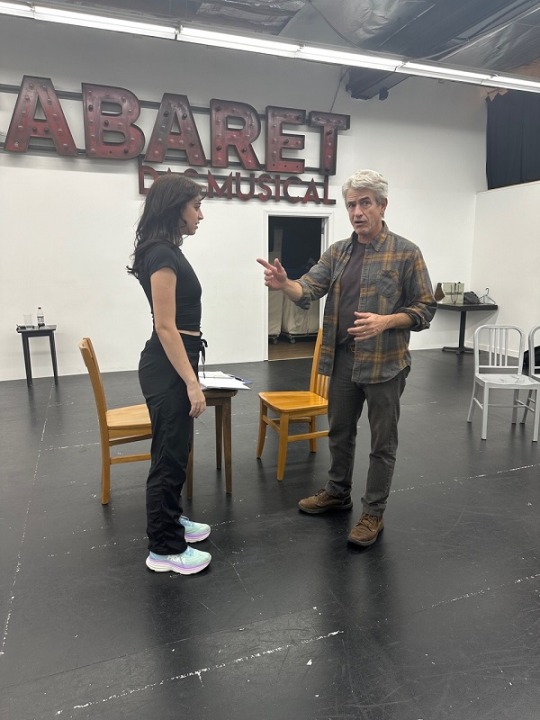
Mack & Mabel, however, is a whole different animal.
“It’s hugely challenging for me,” Dermot admits. “It’s a world I’ve never inhabited. The two times I’ve been in musicals were in my senior year at Northwestern University, a thousand-seat theater. I sang in an operetta, as Ko-Ko The Executioner in Gilbert & Sullivan’s The Mikado.”
There is also the one that got away: the time that Francis Ford Coppola chose Dermot to play The Big Kahuna in his ambitious Gidget stage musical (alas, it never got past the workshop phase). And he has indeed sung in public before: on the big screen, to Julia Roberts, on a boat (see it here).
Mack & Mabel, though, is the musical Big Time. It fits nicely with his continuing busy career, including a key supporting role in the current hit romcom Anyone But You, as well as his turn as Detective Bailey in Scream 6.
“I’ve just been incredibly blessed,” he says of his journey. “I’ll admit, that’s what I thought the assignment was when I first became an actor, to be a man of a thousand faces.”
His face can now also be regularly seen on social media, as he has pumped up his posts on Instagram. Most of them push his current projects, but he also shares the kick he gets out the universally common misspelling of his name (think “Dermont” on a Starbucks cup).
“That is so fun for me because it’s happened to me my whole life,” he says.
Still, he enters the world of social media carefully, and treads lightly, as online life can sometimes do bad things to our offline attention spans.
The solution?
“We have to re-expand our attention spans,” he says. “That’s why the four-five-six-month learning process on Mack & Mabel has been incredibly good for my brain.”
Find out more about Mack & Mabel here.
Copyright ©2024 PopEntertainment.com. All rights reserved. Posted: February 12, 2024.
Photo #1 © 2018 Robby Klein/Contour by Getty Images. Courtesy of Ken Werther PR. All rights reserved.
Photos #2 & 3 © 2024. Courtesy of Ken Werther PR. All rights reserved.
youtube
4 notes
·
View notes
Text
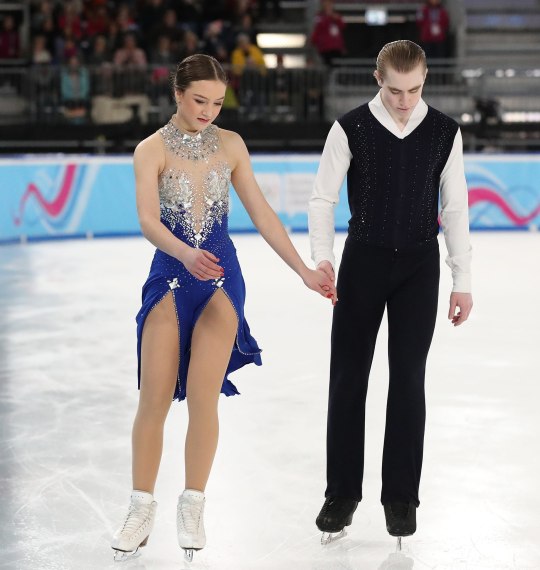
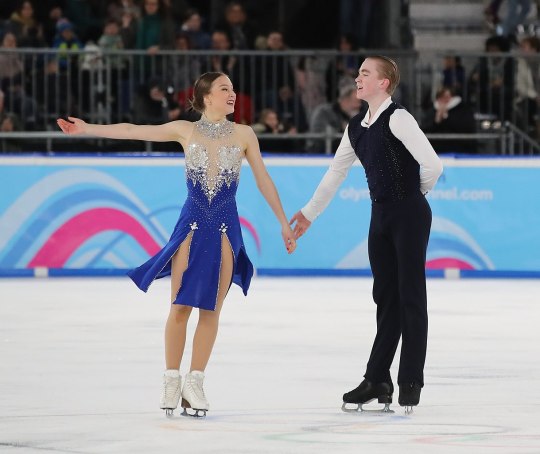


Natalie D'Alessandro and Bruce Waddell skating to music from Funny Face and Victor/Victoria for their rhythm dance at the 2020 Youth Olympics.
(Source: Wikimedia Commons)
#Tea Time Foxtrot#Musicals Operetta Broadway#Natalie D'Alessandro#Bruce Waddell#D'Alessandro Waddell#Ice dance#Figure skating#Canada#2019–2020#2020 Youth Olympics#Funny Face#Le Jazz Hot#Victor Victoria#George Gershwin#Henry Mancini
17 notes
·
View notes
Note
Any opera recs for a musical theater nerd who keeps wanting to check opera out and hasn’t gotten around to it yet?
ooh!!! as a lover of both opera and musical theater, YES!!!
so here are some basics:
-any operetta or light opera basically ever. some of the best: gilbert and sullivan. johann strauss’ die fledermaus (the bat). franz lehar’s die lustige witwe (the merry widow). any jacques offenbach operetta, ESPECIALLY orphée aux enfers (orpheus in the underworld, aka the one with the famous can-can) or la vie parisienne (the parisian life). leonard bernstein’s genre-defying candide.
-speaking of which, there are a LOT of good, reasonably short american operas out there. george gershwin’s porgy and bess (the source of MANY standards, most notably “summertime”) premiered on broadway, actually. so did gian carlo menotti’s the saint of bleecker street. others i’d recommend: menotti’s the medium, carlisle floyd’s susannah, kurt weill’s street scene. all of these are pretty intense/tragic though. my fave in a lighter vein is bernstein’s trouble in tahiti, which i saw live once and it was DELISH.
-giacomo puccini and his contemporaries are a GOLD mine for musical-loving opera newbies. they’re reasonably short operas, they’re INTENSE, they’ve got amazing scores. so:
puccini’s la bohème: yeah, rent is based on it. however: VERY MUCH NOT THE SAME. (bohème is better imo.)
puccini’s tosca: you want an intense night at the opera? this one has EVERYTHING. it’s a straight up thriller. basically everyone dies. the music is glorious.
i’m not a huge fan of puccini’s madama butterfly but miss saigon is based on it, so there’s that i guess.
puccini’s il trittico: three short (1 hour) operas with three wildly different moods: il tabarro (the cloak) is a thriller, suor angelica is about a nun Going Through Some Shit and is DEVASTATING, gianni schicchi is a side-busting comedy and also has that iconic aria “o mio babbino caro”.
pietro mascagni’s cavalleria rusticana (rustic chivalry) and ruggero leoncavallo’s pagliacci (clowns) are a frequent double bill. they’re both INTENSE short operas about infidelity and passion and revenge and murder. and they both have tunes you will recognize.
-other recommendations:
-wolfgang amadeus mozart’s die zauberflöte (the magic flute), which has lots of spoken dialogue and hit tunes. MAJOR caveat however: you’re better off picking a production that plays much more fast and loose with the dialogue and lyrics because the original is uh…HUGELY racist and sexist! look up the pacific opera project’s nintendo-themed production on youtube.
-gioachino rossini’s il barbiere di siviglia (the barber of seville). hilarious as shit. so many shenanigans. can be a little long for a newbie but yeah. plus: TUNES.
-gaetano donizetti’s l’elisir d’amore (the elixir of love), don pasquale, la fille du régiment (the daughter of the regiment), and lucia di lammermoor. the first three are hilarious comedies, the last one is a tragedy of bloody murder with an ICONIC mad scene for the soprano.
-giuseppe verdi’s rigoletto and la traviata. both pretty short (~2 hours or so). both have iconic tunes and great stories. the latter is more or less the basis of both pretty woman and moulin rouge.
-georges bizet’s carmen. SO MANY HIT TUNES YOU WILL RECOGNIZE. also the basis of carmen jones.
-maurice ravel’s l’heure espagnole (the spanish hour). it’s a short opera about a woman who juggles three lovers by hiding two of them inside clocks in her husband’s clock shop. it’s risqué and funny and fun and does not get done enough.
-if you like WEIRD german stuff: richard strauss’ salome (which i love, but it’s disturbing as fuck) and elektra (which i don’t love but respect people who do) and alban berg’s wozzeck (SUPER weird and disturbing) are all in the 1.5-2 hour range and have been known to make unexpected fans of newbies. but do not attempt these unless you’re willing to experience a total mindfuck.
i hope that helps some! fellow operablr members pls feel free to add anything i may have overlooked 💗
16 notes
·
View notes
Text
The Legend of Anastasia
read it on AO3 at https://ift.tt/1btsVYO
by CozyFanastasia
Perhaps the myth of a surviving Nikolaevna is a lie we tell ourselves because it’s easier than accepting the slaughter of their innocent children for the sins of the parents. The hope that a 17-year-old girl gets the chance to grow old and have a happy ending…
A rewrite of the Anastasia musical for a movie adaptation. I feel like this story could work very well on film. I was inspired by different aspects of the Anastasia plays, films, ballets, the operetta, and stage musicals. This is an adaption of the Hartford production with parts from the Broadway show and tours in it. This version leans more into historical fiction.
I know normal movie scripts don’t have this much description, this is just have I’m visualizing it. I hope that you enjoy it.
TRIGGER WARNINGS: MURDER OF THE ROYAL FAMILY, THEIR SERVANTS, AND DOGS, GRAPHIC VIOLENCE, GORE, VIOLENT PROTESTS, GUN VIOLENCE, WAR, REVOLUTIONS.
Words: 11600, Chapters: 3/25, Language: English
Fandoms: Anastasia - Flaherty/Ahrens/McNally, Anastasia (1997), Anastasia (1956), Anastasia - Maurette
Rating: Teen And Up Audiences
Warnings: Graphic Depictions Of Violence, Major Character Death
Categories: F/M
Characters: Anya | Anastasia Romanov (Anastasia 1997 & Broadway), Dimitri | Dmitry (Anastasia 1997 & Broadway), Gleb Vaganov, Vlad Popov, Dowager Empress (Anastasia 1997 & Broadway), Nikolay Alexandrovich Romanov | Nicholas II of Russia, Grigori Rasputin, Rasputin (Anastasia 1997), Olga Alexandrovna Romanova, OTMA, Tatiana Nikolaevna Romanova (1897-1918), Ortipo | Tatiana Nikolaevna Romanova (1897-1918)'s Dog, Olga Nikolaevna Romanova (1895-1918), Maria Nikolaevna Romanova (1899-1918), Anastasia Nikolaevna Romanova (1901-1918), Alexei Nikolaevich Romanov (1904-1918), Alexei Romanov (Anastasia 1997 & Broadway), Alix of Hesse | Alexandra Feodorovna, Xenia Alexandrovna Romanova, Anna Anderson | Anastasia Nikolaevna Romanova
Relationships: Dimitri | Dmitry/Anya | Anastasia Romanov (Anastasia 1997 & Broadway), Anya | Anastasia Romanov/Gleb Vaganov
Additional Tags: Musical, Inspired by Anastasia (1997 & Broadway), Inspired by Real Events, Inspired by Art, historical fiction - Freeform, Alternate Universe - Anastasia (1997 & Broadway) Fusion, Gleb Vaganov - Freeform, dimitri - Freeform, Anya - Freeform, vlad popov - Freeform, Glenya, dimya, Song: Once Upon a December (Anastasia 1997 & Broadway), Journey To The Past, musical rrewrite, musical adaptation, Musical References, Cannon Divergence, Russian History, References to Anastasia (1997 & Broadway), Song: In a Crowd Of Thousands (Anastasia Broadway), Song: Still/The Neva Flows (Anastasia Broadway), Song: Quartet at the Ballet (Anastasia 1997 & Broadway), Melodrama, anastasia 1956, anastasia ballet, Ballet, Swan Lake - Freeform
read it on AO3 at https://ift.tt/1btsVYO
2 notes
·
View notes
Text
Top 10 Songs from “Phantom of the Opera”
“Seal my fate tonight! I hate to have to cut the fun short, but the joke’s wearing thin…let the audience in…let my opera BEGIN!”
Tonight is a big and tragic night. Tonight will mark the final Broadway performance - after 35 years - of Andrew Lloyd Webber’s “Phantom of the Opera.” Till now, the show has been the single longest-running musical in Broadway history, and one of the longest running stage shows in the world. While it is entirely possible the show could come back in a Revival sometime, and the musical itself isn’t necessarily going anywhere - as far as I’m aware, it’s still set to run a while on the West End, not to mention various other International and Touring productions - it is sad that such a mainstay of Broadway will, after three-and-a-half decades, finally be coming to an end.
“Phantom” is one of my top three favorite stage musicals, and so I felt it was only fair that - today - I give it the kudos it deserves by talking about what is arguably the most important thing in a musical: the music. Many would consider this to be Andrew Lloyd Webber’s masterpiece, the pinnacle and peak of his musical career, and the songs featured in it are as immortal as the Gothic novel upon which it is based, not to mention the age-old themes and ideas contained inside. It is a story of horror and beauty, of love and hate, of triumph and tragedy. The songs in the show run the gamut from lighthearted and almost farcical operetta to contemporary rock-opera hybrid mayhem, all without feeling like anything is too out of place; a hard balancing act to accomplish. There are no less than twenty-one tunes in the score for Phantom, and the show is almost completely sung through from start to finish. Choosing my favorite songs was tough, but I think I’ve managed. Oh, and while I doubt I need to say this…just for warning in case, SPOILERS!
Without further ado, here are My Top 10 Songs from Andrew Lloyd Webber’s “The Phantom of the Opera!”
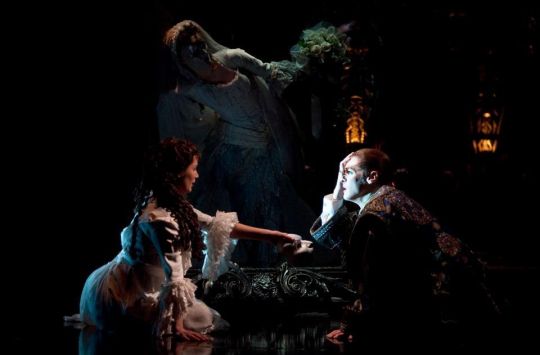
10. I Remember/Stranger Than You Dreamt It.
In all honesty, it’s more the SCENE than the song that gets this tune onto the list. This is the iconic moment in the story where Christine first unmasks the Phantom. The two-part sequence begins with the dreamy, dazed-sounding “I Remember,” as Christine stirs from her sleep and sees the Phantom playing his organ, sketching down notes for his “Don Juan Triumphant.” When she approaches and removes the mask, the music abruptly jolts into “Stranger Than You Dreamt It,” which, itself, has a sort of two-part structure: the first half is wild, frenzied, and psychotic, as the Phantom flies into a rage at being unmasked…but then drops down into a slower, softer, almost pleading tune, as he calms down from his fit of temper and tries to apologize and explain the deeper layers to the horrified Christine. While the song isn’t exactly one I sing in passing, so to speak, the scene is a major turning point in the tale, and the way the music swings back and forth between the different characters and emotional fulcrums makes this a memorable scene in the story.
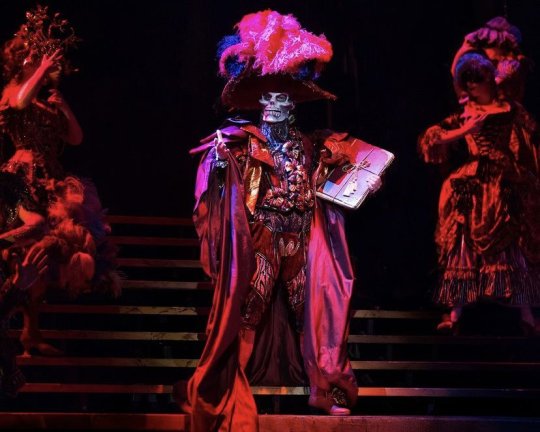
9. Masquerade/Why So Silent?
Technically, this is two songs (sort of like the previous pick), but since one basically leads into the other, I felt I should count them both. One of the most iconic songs in the show, “Masquerade” opens up Act II on a deceptively positive note. Taking place a year after the events of Act I, we see that the main characters are attending and hosting grand masquerade ball inside the opera house. It’s made clear that, apparently, the mysterious Phantom has not been seen in a while, and that our other two leads - Christine and Raoul - are officially engaged to be married. The song itself is a symbolic piece, using the ball itself as a metaphor for several things: the way people hide their true intentions or beliefs, the false sense of security that the scene paints, the secrets that Raoul and Christine are keeping, and so on. These analogies prove to be prophetic, as the song transitions into “Why So Silent?” as the Phantom does, predictably, return, crashing the masked ball in the guise of Poe’s Red Death. While the Red Death scene is short, it’s honestly one of my favorite moments in the show: the Red Death costume, the funeral-dirge-like music that stomps down the one gay revelry, and the mysterious warnings delivered by the Phantom are all delicious.
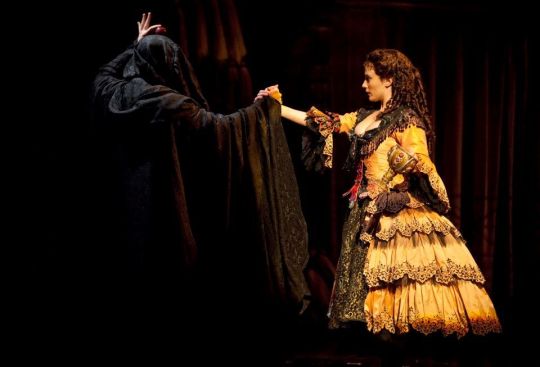
8. Point of No Return.
A lot of people are probably surprised to see this song so low in the ranks, I imagine. The honest truth about why is simply that, while I love this song, I just don’t tend to sing it or reference it in passing as often as the rest on this list. It’s a great number, I guess it’s just not the one I most immediately think about. The song takes place when the Opera House puts on the Phantom’s own opera, “Don Juan Triumphant,” as a way of trying to trap the madman. Christine plays the main character in this play-within-a-play. The Phantom is wise to their tricks, however, as he disguises himself as the male lead - Don Juan himself - by murdering the would-be performer, Piangi, and taking his place onstage. These events lead to this song, as the Phantom uses his own composition to his advantage, trying to seduce Christine and spirit her away with it never seeming out of the ordinary. At the same time Christine realizes the Phantom is her partner in the duet, and has to find some way to reveal him without ruining Raoul’s trap for the villain. It’s a song of tension, deception, and sensual excitement, with a lot of different layers to it for the characters involved.
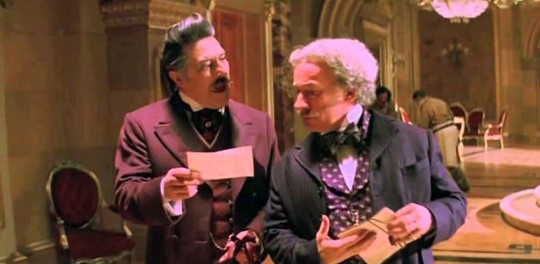
7. Notes.
Just as it was likely odd to see “Point of No Return” so low in the ranks, seeing “Notes” above it is probably equally baffling. The truth is that I just sort of reference and hum along to “Notes” a lot more, in general; it’s a catchy, simple beat and song that’s easy to do that to. It also probably helps that, if I had to play any role in Phantom of the Opera, I’d actually want to play one of The Managers most, and this song - based around their key leitmotif, which is reprised and reused throughout the show - is the primary reason why. “Notes” occurs part of the way through Act I, and - as the title implies - it revolves around several characters, most notably the Managers, all receiving mysterious notes all signed by the Opera Ghost, detailing his plans for the Opera House and his demands of those inside. It’s a comical, pattering sort of tune, which feels similar in nature to some of the works of Gilbert & Sullivan, and it allows for a bit of levity amidst the darker themes and sequences at play within the show, while still serving the story.
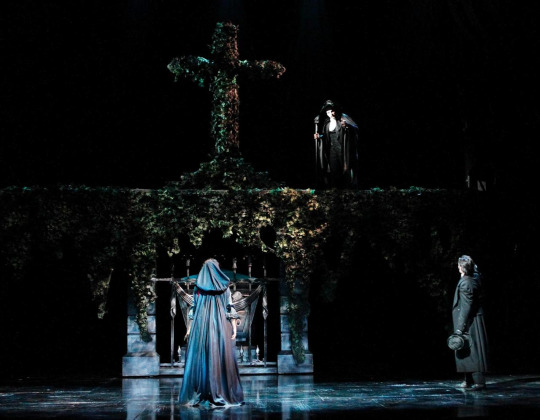
6. Wandering Child.
Another tune based around a repeated leitmotif in the show, this is arguably the ultimate culmination of the “Angel of Music” theme that plays throughout the musical. Taking place after the grand aria “Wishing You Were Somehow Here Again” (more on that later), the song has the Phantom - who hasn’t been seen in a while in the show, having seemingly vanished after the Red Death sequence - making his grand reappearance before Christine. He tries to use his hypnotic abilities to entice her back to him, claiming to be the Angel of Music her father promised to send her. The song is grand, beautiful, and romantic, but with a dangerous undercurrent; a haunting tune that matches the Phantom himself, as he tries to lure Christine back to him one last time, as peacefully as possible. This attempt is interrupted, however, by the arrival of Raoul…and it’s here that things get interesting. In some productions, the three actually sing a three-part chorus, making this one of only two parts of the show where all three of the main characters are singing in tandem. In others, Raoul just interrupts at the last minute, barging in and breaking up the harmony with a verse all his own. Personally, I prefer the former approach, but the song is still great even if the alternative option is used.
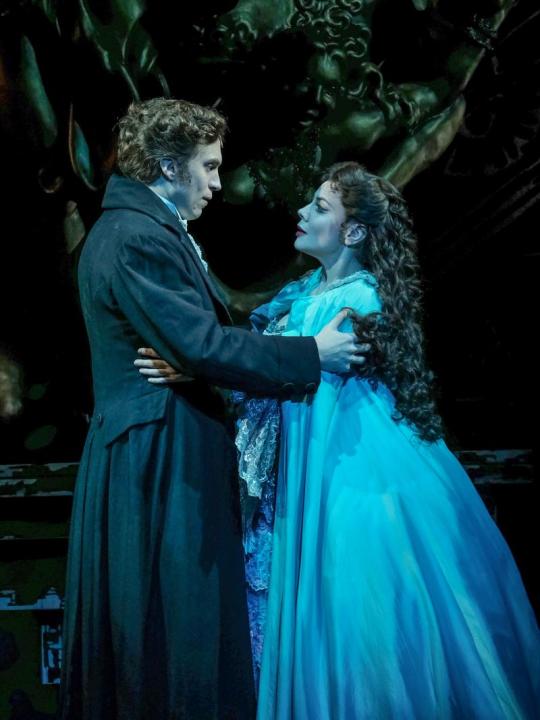
5. All I Ask of You (Plus the Reprise).
Much like with “Masquerade,” this is technically two songs, but again, one immediately follows the other, and it’s all basically the same tune. This is the great love song of the show, performed between Christine and Raoul. After the Phantom commits his first murder, and Christine tells Raoul about the reality of the situation, Raoul tries to comfort her. The two end up confessing their love for each other in the process, and decide to officially jumpstart their relationship, right then and there, as Raoul offers Christine security and care, and she accepts his hopeful affections. This easily could have been a corny and cheesy sort of old-fashioned love ballad, but it actually becomes a truly sweet, lush, and powerful moment, especially when handled by excellent actors, who can bring something special to the sequence. I will never understand the hate Raoul gets after songs like this, to be perfectly honest…but with that said, arguably the part that tops this song is the reprise that follows. It turns out the Phantom was watching the scene of love serene with jealousy and surprise (bravo, if you get that reference), and - feeling dejected and betrayed by Christine - he thus vows vengeance on both the lovers and all others who dwell inside the Opera House. The two versions of the same song act as a major turning point in the show, and make for a spectacular closure to the first act.

4. The Final Lair.
“The Final Lair” is a medley of different things put together that create the grand finale of the show. I actually don’t want to go too into detail here, in terms of story, because - even though I am giving away spoilers throughout this - I feel the one thing I DON’T want to ruin for anybody reading is how the story ends. Suffice it to say, this sequence marks the moment where the Phantom - unmasked and VERY unstable - has his final confrontation with both Christine and Raoul. Christine is forced to make the toughest choice she’s ever faced in her life, completing her own story arc, all while an angry mob tries to ferret out the Phantom’s secret lair, adding a sort of “ticking clock” element to the story. At this point, the Phantom is completely out of control: different actors depict the Phantom’s rage-and-despair-fueled insanity in different ways, but it’s the moment where the performer can completely cut loose, as the monster under the mask is fully unveiled. For Christine, this is one of the meatiest part of the show for the character, and every actress is able to bring different elements of her final duel of wills with her erstwhile Angel of Music in a different way. While Raoul has arguably the weakest part of the three, his presence is still necessary and acts as the culmination of the love triangle the story hinges upon. It’s a deranged whirlwind of emotions and passions that make for a marvelous finale to this decadently delightful tale.

3. The Phantom of the Opera.
The title song of the show is an anomaly in the soundtrack, as it combines the more classical, typically operatic music found throughout the rest of the show with an 80s-era rock-and-roll vibe, complete with a bangin’ (do the kids still say that these days?) electric guitar. The song occurs early in the show, and acts as the grand reveal of the Phantom himself, in full, as he leads Christine - victorious after her great stage star debut - down into his lair, apparently with some sort of reward in mind for her after her success. The song is a showstopper with a point, as it gloriously illustrates the relationship between Christine and the Phantom, and gives the Phantom the rousing introduction such a powerful character requires. To be blunt, it’s at this point in the story where you KNOW this show is going to be good, and there’s a good reason this song is almost always featured when snippets of the show are performed for special events: it’s a great duet that gives the main protagonist AND main antagonist equal part, and it poetically and catchily describes the story’s primary focus in a nefarious nutshell. It more than deserves placement in my Top 3.

2. Wishing You Were Somehow Here Again.
I actually had a hard time choosing between my top two songs. Each acts as the focal solo number for one of the two main characters, and each has a slightly similar, highly emotional tone. Christine’s song is this one, and it is, in my opinion, the single most emotional and heart-catching of the two. Uncertain, scared, and slightly depressed after everything that’s gone down so far, Christine wanders to the graveyard to pray at her father’s tomb. The song she sings is so many things at once: she feels lost without her father there, and always has, and she’s never felt more lost than now. She remembers the good things about him as best she can, while also trying to let go of his memory…but no matter how hard she tries, all those comforting thoughts and those strong desires cannot completely erase her sorrow, more palpable than ever before. If you have ever lost someone close to you - a parent, a grandparent, even a very dear friend - then you will easily be able to understand everything the poor young lady goes through here. If you have not…you can have no idea how it feels.
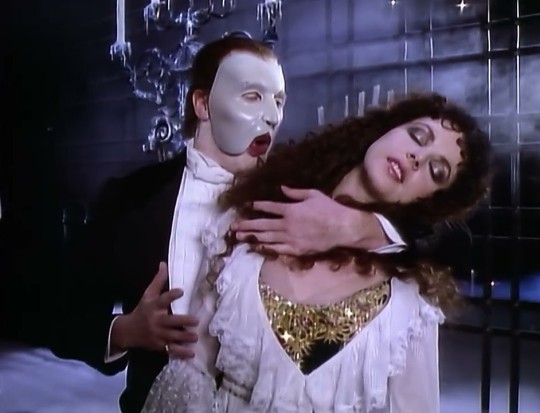
1. Music of the Night.
While “Wishing” is undeniably the most emotional song in the show for me, “Music of the Night” is easily the standout piece of the musical for me. This is the Phantom’s grand solo, performed before Christine as he guides her around his underground lair, and tries to seduce her for the first time. While the “Angel of Music” anthem found in songs like “Wandering Child” certainly describes the Phantom in a succinct fashion, “Music of the Night” gives us a proper look into the mind of the so-called monster, to see the man and his passions underneath. The song is sultry and shadowy, yet never truly scary or intimidating. I always personally felt that the Phantom’s love for Christine was more than mere physical attraction; he cares for her in a very real and powerful way, and he wants her to care for him in the same manner. He’s just not entirely sure how to express that desire and that emotion. This is the song where he tries to do just that. The tune warps between a lilting, almost lullaby-like melody to something grander and more glorious, the Phantom changing tactics between soft, inviting, almost pleading methods to more forceful techniques, as he tries to seduce Christine to his side in more ways than one. It is this song that first makes us feel pity and sympathy for the Phantom, and makes us realize he’s more than just the dark and dangerous figure we’ve been led to expect up till now. As beautiful as it is important to the story and character, “Music of the Night” is, without a doubt, My Favorite Song from Andrew Lloyd Webber’s “The Phantom of the Opera.”
Honorable Mentions Include…
Prima Donna.
Angel of Music.
The Mirror (Angel of Music).
Why Have You Brought Me Here?/Raoul, I’ve Been There.
#list#countdown#favorites#best#songs#music#phantom of the opera#andrew lloyd webber#broadway#west end#musicals#musical theatre#theatre#top 10#rip phantom on broadway
8 notes
·
View notes
Text
A Christmas Carol Holiday Season: "The Stingiest Man in Town" (1956 TV musical)
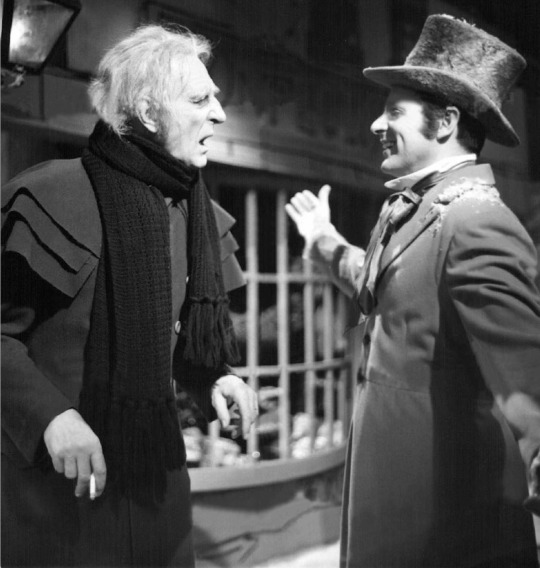
In some ways, this oddly-titled Christmas Carol musical is a cousin to the Shower of Stars version of 1954. Both are TV musicals that aired as part of an anthology series, in this case The Alcoa Hour. Both were originally broadcast in color, but only survive in black-and-white. And both feature Basil Rathbone, who here trades his 1954 role of Marley's Ghost for the starring role of Scrooge. But there, for the most part, the similarities end. While the 1954 Carol features a classical operetta-style score by Bernard Hermann, this production, with music by Fred Spielman and both book and lyrics by Janice Torre, is an all-American Broadway-style musical.
The cast that supports Rathbone's Scrooge includes pop singers Johnny Desmond as Fred, Vic Damone as Young Scrooge, and the Four Lads narrating the story in music, as well as two stars of the Metropolitan Opera stage, baritone Robert Weede as Marley's Ghost and soprano Patrice Munsel as Belle. They sing a wide array of tuneful songs: "Holly-Ho," "An Old-Fashioned Christmas," "The Stingiest Man in Town," "I Wear a Chain," "Golden Dreams," "It Might Have Been," "The Christmas Spirit," "Yes, There Is a Santa Claus," "One Little Boy," "The Birthday Party of the King," and "Mankind Should Be My Business." Some of these songs come with lengthy dance sequences too.
With all this music and dance, and at a running time of only slightly over an hour, the story is, of course, slightly condensed. The Ghost of Christmas Past (portrayed as a bearded old man by Ian Martin) doesn't show Scrooge his childhood, just the Fezziwig party and his romance with Belle, and later, Tiny Tim's possible death is only mentioned by the Ghost of Christmas Present (Robert Wright), not shown by the Ghost of Christmas Yet to Come (Keith Herrington).
Dickens purists probably won't call this production a favorite. The style of music is sometimes too "1950s Broadway" for such a classic Victorian tale, reinforced by the fact that apart from the few British performers (Rathbone, Martyn Green as Bob Cratchit, and a few others) most of the cast uses their own American accents. Some of the lyrics are corny too. But there's still plenty to enjoy. For the most part, the songs are memorable and charming, and the casting ranges from solid to excellent. Rathbone's Scrooge is colorful and convincing both his early crotchetiness and in his transformation, with just a slight a hint of caricature, and while his singing voice is mediocre, it still suits the role.
This might not be the most Dickensian Christmas Carol adaptation, but if you enjoy musical versions of the tale, then it's a must-see.
@ariel-seagull-wings, @thealmightyemprex., @reds-revenge, @faintingheroine, @thatscarletflycatcher
#a christmas carol holiday season#the stingiest man in town#1956#the alcoa hour#television#live action#musical#basil rathbone
16 notes
·
View notes